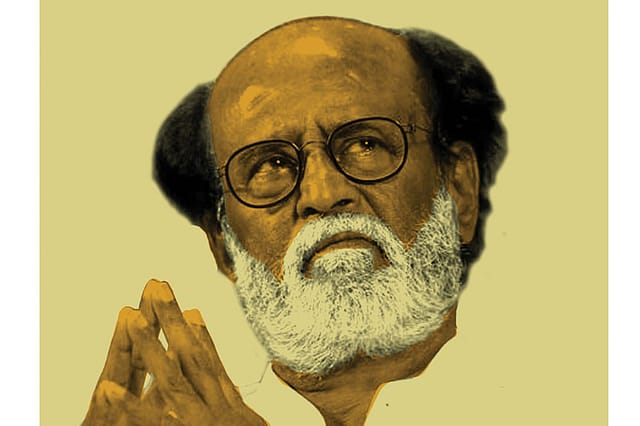Rajinikanth:A Perpetual Tease

FOR SEVERAL YEARS now, and especially in the wake of former Chief Minister J Jayalalithaa's death in December 2016, Tamil Nadu has waited for Rajinikanth to act—and to stop acting. The possibility of south India's most popular actor turning politician had started to seem like a freestanding fiction. So when he made his first speech as a politician, upon opening a statue of MGR at a college in Chennai in March 2018, and channelled the Bhagavad Gita to declare, "The time has come for me to enter politics", it was a spasm in historical time.
By promising to cultivate his fan base into a political party, however, Rajini had once again played to the gallery—or played them. Apart from making facile statements when prodded, he continued to steer clear of public discourse and emerged only to promote bad films, sparking criticism that he was faltering in his commitment to politics. But the cloak of silence fell when he raked Periyar, the grand old man of Dravidian resistance, over the coals for allegedly parading naked effigies of Rama and Sita down the streets of Salem in 1971. Speaking at Tamil magazine Thuglak's 50th anniversary event in Chennai on January 14th, Rajini appeared to pay tribute to its founder, the late Cho Ramaswamy, by claiming he was the only editor brave enough to condemn Periyar at the time. Dravidian outfits immediately took umbrage and contested the veracity of his statement. D Jayakumar, Minister for Fisheries in the AIADMK government, and MK Stalin, leader of the opposition, spoke in one voice, condemning Rajini's lack of tact and accusing him of deliberately missing the forest for the trees. Any doubts that it was an inadvertent folly were dispelled when the actor refused to apologise, brandishing excavated news articles as 'proof' he had served up a bitter truth.
Openomics 2026: Continuity and Conviction
06 Feb 2026 - Vol 04 | Issue 57
The performance state at its peak
When Tamil Nadu's most loved star takes on its most controversial ideologue, you know it is not for the purpose of settling an old argument. Reading between the lines, commentators have variously interpreted it as an endorsement of the BJP's agenda for the nation, an early attempt at seizing middle-class Brahmin and caste Hindu votes and a sharp-elbowed intervention to put the DMK, going to the polls next year with a campaign designed by Prashant Kishore, on the defensive. For the AIADMK, facing its first Assembly election without 'Amma' in 30 years, associating with a popular icon could help replenish its vote bank, but the party would have to adopt a slightly different tone from him so that its votes don't get divided, says writer and journalist Maalan Narayanan."It is not so much a concern for the DMK as it is for the AIADMK, which is yet undecided about aligning with the BJP," he says.
By using Periyar as a scaffold to repair his reputation, Rajinikanth has declared loud and clear that his tenuous self-imposed political exile is over. Arguments that he is a puppet in the hands of RSS thinker S Gurumurthy, also said to be behind the rise and fall of O Panneerselvam in the AIADMK succession battle, fall flat against the choices Rajini has made in his professional life of late. In Darbar, his latest, whose release coincided with the controversy, he plays a cop of indeterminate age who is a stalker and trigger-happy reactionary. His character seems to endorse strict police action of the kind that Tamil Nadu—and the rest of India—has been agitating against. In fact, Rajinikanth had made no secret of his disapproval of the anti-Sterlite movement in Thoothukudi, even remarking that "continuous protests would turn Tamil Nadu into a graveyard".
Was there a road-to-Damascus moment in his ideological evolution? Did he enter politics with his principles of public service fully formed or is democracy a pit stop for an opportunist in search of another refuge? And how could he be content with poking his head out of the window when he could have jumped the wall as early as in 1996? His action, or the lack of it, in the course of this year, should supply some answers.
